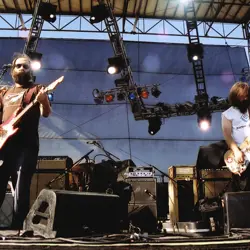 Built To Spill
Built To SpillThis was a night for the guitars. Loud, textural and visceral six-string magic. Opener Ben Salter had a keyboardist in his live band who added some fine organ and synth sounds but the Gin Club head honcho showed that his solo material leans more towards rhythm-heavy, guitar-led rock songs. Not in a primitive sense though, Salter's fine way with words and his voice, which only occasionally gets ragged and unhinged, ensure that the songs were the focus of an impressive set.
Built To Spill flew under the '90s alt-rock radar. They were never part of the A-league of grunge but they were highly respected and gathered devoted fans around them, much like Modest Mouse. Doug Martsch, the band's mastermind and sole consistent member, was held up as a guitar hero and creative lyricist with his distinctive high register vocals. Now, with a new rhythm section in tow they finally returned to Australia and delivered a workmanlike but thoroughly on-point trip through their back catalogue with a particular spotlight on their recent album Untethered Moon. That record provided some of the set highlights with the songs Never Be The Same and On The Way.
Martsch was completely unassuming as a frontman, with little interaction with the crowd, gazing out across them like he was still processing where he was. That is no criticism of the man for he delivered in spades with his slashing chords and quirky riffs and that thin, wavering and soaring voice (think J Mascis and Neil Young) that defines his sound. With three guitarists, the effect was a widescreen montage of spiralling classic rock solos, contrasting psych textures and melodies that made for a wonderfully warm and captivating sound. The real (and unexpected) treat in the encore was a cover of The Smiths' How Soon Is Now? that was surprisingly faithful to the original and showed that in a strange way there was a similar seam of off-kilter guitar creativity going on in both '80s Manchester and '90s Boise, Idaho.
















